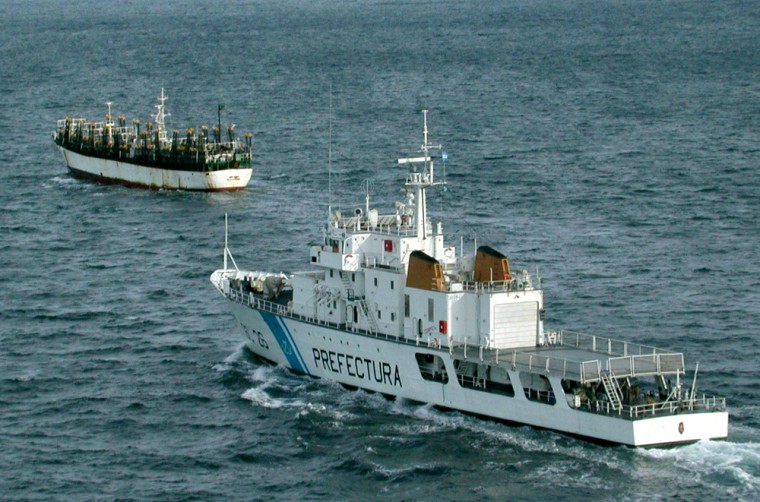The Argentine coast guard ship, crashing through white-capped Atlantic waters and battling 40 mile-an-hour head winds, finally caught up to the South Korean fishing boat after a two-hour chase.
When Argentine officials hoisted hook ladders and boarded the vessel earlier this month, what they discovered in the ice-filled hold came as no surprise: a mountain of freshly caught shortfin squid, one of the most popular delicacies found on dinner plates throughout Asia.
"It's the fourth boat fishing illegally that we've chased and captured this year, just in this district," said Capt. Pedro Mele, recounting the chase in the coast guard headquarters overlooking this iron-gray port. "It had about 20 tons of processed squid on board, and more that was unprocessed."
The four seizures are a point of national pride, but officials said many more foreign fishing boats in search of Argentine squid -- an increasingly sought-after staple of Asian dishes and Spanish paellas -- have evaded capture. Hundreds of Asian boats are spotted each year illegally dropping their nets and lines in Argentine territorial waters, which extend 200 nautical miles from the coast.
In the past decade, Argentina's seafood harvest has exploded. In the early 1990s, the ocean catch was virtually negligible in terms of revenue. Since then, it has surpassed Argentina's celebrated beef, in most years bringing in $800 million to $1 billion. Last year, Argentina exported 493,000 metric tons of seafood.
Consequently, the country recently has become especially protective of its maritime resources. The Defense Ministry this year ordered more fast boats to patrol against ocean poaching. Last year, an Argentine warship fired a warning missile toward a Taiwanese fishing boat as it fled toward international waters; no damage or injuries resulted.
Fines of about $350,000 have been imposed to deter illegal fishing, and authorities have reported that some fishing crews have actually sunk their boats and escaped to other vessels, presumably to avoid the penalties.
Much to the annoyance of fishery officials, a ragtag flotilla of foreign fishing boats routinely hovers just outside the Argentina's territorial waters, flirting with a line that is very difficult to safeguard.
The boats may fish with impunity outside the boundary, but the migratory squid, which range from waters near the Falkland Islands toward the Uruguayan coast, often tempt them to cross the invisible line. Conservationists express concern that the harvesting, even if legal, may be dangerously depleting the squid population and harming the ecological balance of the sea.
"The boats are risking more and more all the time," said Eduardo Coutinho, chief of operations for the coast guard at Comodoro Rivadavia.
'The entire population is having trouble'
Although there are more than 100 known species of squid, the Argentine shortfin -- or Illex argentinus -- is one of two that together constitute the majority of the international calamari market.
The squid live for only about a year and are highly reproductive, which inherently protects them from overfishing. But last year's squid catch was less than one-fourth of the harvest five years earlier, when the area was labeled the world's fastest-growing fishery by the U.N. Environment Program.
"The squid have been overfished, and the entire population is having trouble," said Claudio Campagna, who spearheads the Wildlife Conservation Society's programs in Argentina. He added that a drastic reduction in the squid population could create problems for some of the region's high-profile exotic species, such as penguins and whales, which attract thousands of tourists to Patagonia each year. Penguins and sea lions eat fish and squid; killer whales then eat animals such as sea lions.
"The southwest Atlantic is one of the last great frontiers where you can find animals like elephant seals and penguins and whales sharing a system, and the squid is certainly part of that system, too," Campagna said.
But protecting an ecological balance is tricky business when dealing with something as wide and unruly as the ocean, and politics have made it even harder to navigate. Argentina's dispute with Britain over the sovereignty of the Falkland Islands -- a still-simmering disagreement that prompted a war between the nations in 1982 -- has complicated the management of a resource that swims between both countries' jurisdictions.
Because the vast majority of boats caught fishing illegally are from Asian countries such as Korea and Taiwan, Argentine officials said they have begun discussions with representatives from several Asian countries to try to resolve the conflict.
"The Asian countries are large consumers of seafood, and they have strong fishing traditions," said Gerardo Nieto, who is in charge of fishing regulations for the Argentine government. "The squid is a specialty there, and the illex has become a big part of those countries' fishing operations."
China, the largest supplier of squid to the U.S. market, essentially ignored Argentine squid until 1997. But by 2002 its boats were netting 100,000 metric tons from the southwest Atlantic.
A trade agreement between Argentina and the European Union drew many Spanish ships to the South Atlantic during the 1990s; they now supply Spain with much of its squid imports. Spanish ships also have been caught fishing illegally in Argentine territory.
Inside the coast guard offices in Comodoro Rivadavia, teams of uniformed men monitor radar and satellite transmissions, communicating with ships and naval aircraft in search of trespassing boats.
The task is formidable. Radar signals, for example, don't follow the curve of the Earth, which means the Argentines have blind spots. Satellite equipment helps, but the sheer length of Argentina's 5,200-mile coastline makes enforcement difficult and expensive.
"When Canada had problems with illegal fishing, they spent $60 million for protection," Nieto said. "In Argentina, we don't have that kind of money. But we have to be out on the sea, showing a strong presence that says we want to protect our economic zone."
